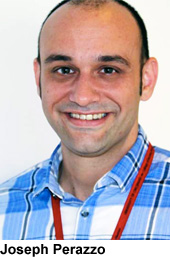What we achieve together is greater than what we achieve alone.

He was hesitant to ask a well-known expert to serve as his mentor, but making that call opened doors for his future work in HIV research.
 More than ever before, nurses are being taught the importance of practice grounded in evidence. Increasingly aware that the health of individuals and communities is influenced by complex factors in the physiological, psychosocial, environmental, and policy domains, research scientists across disciplines and from diverse backgrounds recognize the need to collaborate and translate findings in ways that serve society.
More than ever before, nurses are being taught the importance of practice grounded in evidence. Increasingly aware that the health of individuals and communities is influenced by complex factors in the physiological, psychosocial, environmental, and policy domains, research scientists across disciplines and from diverse backgrounds recognize the need to collaborate and translate findings in ways that serve society.
Nurse scientists are no exception. From coordinating and managing clinical research operations to leading large multisite research projects in academia, there is a growing presence of nurse researchers in all areas of science. Each person involved in these collaborations plays a vital role in acquiring scientific evidence and translating it for implementation in practice.
Research, training, and program grants that make generation of new knowledge possible often require input from and collaboration by a team of experts. For novice clinicians and researchers, collaboration is also crucial to career building, as it enables them to partner with and learn from more experienced professionals. By enabling people from across the globe to coordinate projects, conduct meetings, and share data, technology enhances these relationships beyond measure.
Scientific collaboration is not always simple, however, because it requires willingness to let go of “my way” and mutually develop “our way.” While there are many differences among healthcare disciplines, joining forces to achieve common goals helps eliminate them. For that reason, team science, both nationally and globally, is quickly moving beyond recommendation and becoming requisite.
My collaborative experience
In graduate school, I became very interested in learning about factors that contribute to persistent care delays among people with HIV. Despite the development of and increased access to new drugs, it seemed that article after article ended with a statement to the effect that more research is needed to prevent delays in care.
It just so happened that Judith Feinberg, MD, FACP, FIDSA, a physician well-known for her HIV research, was located just across the street from where I attended the University of Cincinnati College of Nursing. (She now conducts research on occupational injuries and violence, unintentional drug overdoses, and opioid overdose prevention at West Virginia University School of Medicine.) Although I assumed she had neither time nor interest to mentor me, I took a chance and called her. Contrary to my expectation, she welcomed the idea of collaborating with me and declared, “The work nurses do with our patients is crucial, and there is definitely a need!” Feinberg introduced me to other providers—social workers, case managers, a psychologist, and patient navigators—who introduced me to new intake patients for my study. In addition to the assistance she provided as I worked toward my degree, Feinberg’s willingness to collaborate with me helped lay the foundation for my future work.
Following graduate school, I completed a postdoctoral fellowship in symptom science at Case Western Reserve University’s Frances Payne Bolton School of Nursing, where I was introduced to Allison Webel, PhD, RN, and Joachim Voss, PhD, RN, ACRN, FAAN, nurse scientists with HIV expertise. Both had collaborated extensively with HIV nurse researchers from several countries. They welcomed me into their group and immediately gave me the opportunity to help coordinate their most recent research protocol. Before that, I often wondered whether I—“just a nurse”—would be able to do research on a larger scale. These researchers championed each other’s ideas and, much as with other large cohort studies, turned individual research ideas into large-sample, multisite studies that increased participation. They immediately invited me to assist as a study coordinator. As a result, I made friends and received invaluable mentoring.
Following my fellowship, I accepted an assistant professorship at the University of Cincinnati (UC) and continue to be involved with the International Nursing Network for HIV/AIDS Research. My career is still developing, but now it is my turn to pay forward what I have been given. Here at UC, I work with undergraduate and graduate students interested in getting involved with HIV research, and I continue to collaborate with the healthcare team at the University of Cincinnati’s Infectious Diseases Center.
Working together
Generating knowledge and creating—and testing—evidence are, by their nature, the foundation of what we generally call “best practices.” One of the most significant lessons I’ve learned in this early chapter of my career is the importance of collaboration. While we can do some projects alone, creating solutions to complex health problems often requires us to step outside our comfort zone and ask a fellow nurse or someone from another discipline, “I am interested in this; want to work with me?”
I hope other nurses have the same experience I had—and continue to have—collaborating with others. The personal rewards of being part of a team are great, but the impact we can make together is even better. RNL
Joseph D. Perazzo, PhD, RN, ACRN, is assistant professor at the University of Cincinnati College of Nursing in Cincinnati, Ohio, USA.
Editor’s note:
Joseph Perazzo will present “The International Nursing Network for HIV Research: A Global Partnership Advancing Nursing Science” on Sunday, 22 July 2018, at Sigma’s 29th International Nursing Research Congress in Melbourne, Australia. Register here for congress.
Check out these additional articles by presenters at the 29th International Nursing Research Congress.